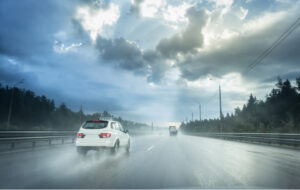 When driving in snowy weather, you may love the outside view and feel cozy inside the vehicle, but the piling up snow or water can on your path prove outright dangerous for you and your family. According to the AAA Foundation for Traffic Safety, bad weather and wet, slippery road conditions are responsible for half a million crashes and 2000 fatalities in the US every winter.
When driving in snowy weather, you may love the outside view and feel cozy inside the vehicle, but the piling up snow or water can on your path prove outright dangerous for you and your family. According to the AAA Foundation for Traffic Safety, bad weather and wet, slippery road conditions are responsible for half a million crashes and 2000 fatalities in the US every winter.
So what happens when you face a car accident on a slippery road? Are you at fault if your vehicle collides with another? Let’s find out:
It’s important to understand here that as a driver, it’s your responsibility to stay aware of the weather conditions and adapt your driving behavior to it. When driving in bad weather, you should anticipate challenges like flooded sections on a roadway, reduced visibility, and slick pavement. Hence, you should not just drive slower than usual but also maintain a greater distance between the vehicle and other cars. Apart from maintaining control, you must take all reasonable measures to avoid collisions.
In case your road accident occurred near your home, you must have been aware of the poor weather conditions, and thus, sections of the roads should be prone to standing water. Ignoring everything, you chose to drive fast and tailgate a vehicle in front of you. You’re certainly at fault for the collision, as it clearly indicates that you were negligent in adapting your driving to the weather.
If, however, you did everything in your power to avoid an accident, you have all the rights to argue that you were not at fault or even that the other driver was negligible. This can be true if that car’s taillights had burned out, its driver switched the lane without prior indication or another type of negligence on their part.
However, proving your point in weather-related accidents is not as easy as it sounds. Investigators will not just take your word into account, but they will also consider the stance of the opposing party as well as interview other people, evaluate the traffic congestion at the time, closely assess the road conditions and the vehicles involved in a collision, and even the black box data from cars before reaching a verdict.

Hence, you need strong legal representation to succeed in a car accident case associated with bad weather. While there are many car accident lawyers out there, no one beats Robert T. Edens. Whether you faced the collision in Chicago, Waukegan, Libertyville, Woodstock, or Antioch, IL, Robert Edens is ready to help you out.